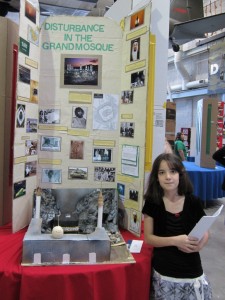Help Send History Students to Washington, D.C.

On Saturday, April 21, the Louisiana History Day State Contest was held at The National WWII Museum. Over 90 projects entered in 5 categories in both middle and high school. Thirty-one projects and 49 students advanced to the National History Day Contest at the University of Maryland, just outside of Washington, D.C.
These 49 students spent countless hours perfecting their projects in order to advance to the National Contest. Their work is not done. Immediately following the Awards Ceremony on April 21, all 49 qualifiers took the feedback from the Contest’s judging panels and began revising their work. The students are updating web sites, revamping exhibit boards, altering performance scripts, and proofreading their work over and over.
Unfortunately, many of these students cannot afford the estimated $700 cost to travel and compete in Washington, DC, making their dream of competing at the National History Day just that — a dream.
So The National WWII Museum is stepping up to help these dedicated and hard-working students realize their full potential, and we’re asking our friends and supporters to help us get them to Washington for the National History Day Contest so they can present their projects.
Will you help us by donating just 50 cents for each of our students?
Your support will help young historians like Hadeel Kasji present her exhibit to judging panels made up of archivists, professors, and curators from some of the nation’s finest institutions. Hadeel is a recent immigrant to the United States. Adapting to a new country was a difficult adjustment. A new language, new customs, and a new school were all challenging for a middle school student. Her teacher suggested that she use the National History Day program to help explore the connections between her old country and her new home.

Hadeel created her exhibit, Disturbance in the Grand Mosque, to do just that. The exhibit describes the impacts of the 1979 Siege of Mecca on both the United States and the Middle East. In 1979, gunmen entered the Grand Mosque to attempt a religious revolution that would stamp out Western influence in the region. Hadeel found that this attempted revolution was a pivotal moment for US relations with Saudi Arabia. Some in the region thought that the US had taken over the mosque. Americans at first blamed Iran for the attack. American Embassies in several Middle Eastern countries were attacked. This siege was one of several major events impacting American relations with the Middle East in 1979 that had major implications for the future.
An avid reader, Hadeel’s consulted 25 different sources to piece together her exhibit. Her bibliography reads like that of a college student with sources found in print, online, and through contacts she made at the Jimmy Carter Presidential Library. Creating this exhibit has helped Hadeel become a critical thinker and allows her to analyze events with proper historical context.
You can help Hadeel and Louisiana’s other 48 national qualifiers with a small donation.
You can find out more about Hadeel and two more national qualifiers on the Museum’s web site.
- Posted :
- Post Category :
- Tags :
- Follow responses to this entry through the RSS 2.0 feed. You can skip to the end and leave a response. Pinging is currently not allowed.




Leave a Reply